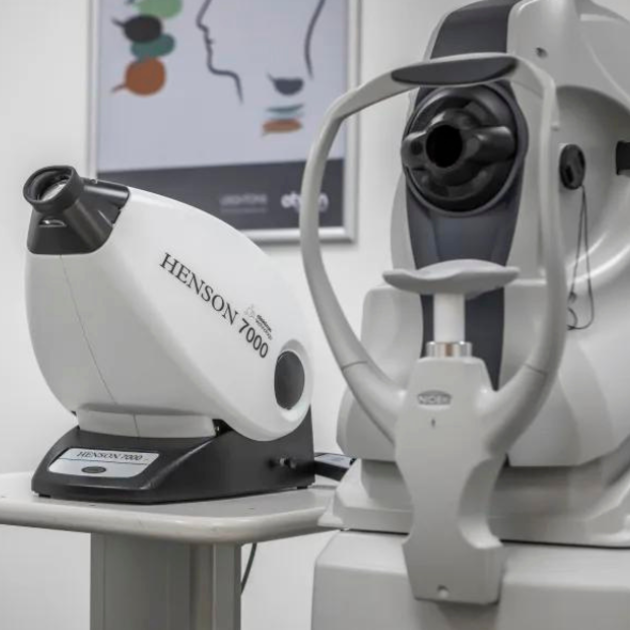What are The Symptoms Of Retinal Migraines?
Feb 19, 2024 in Eye Care

The sudden onset of pain and blindness can be scary and worrying. A retinal migraine is a rare condition that affects the eyes. They involve repeated bouts of short-lasting diminished vision or blindness.
They can be a cause for concern and impact your daily life. So if you have concerns or are just curious, read on to learn more about retinal migraines, what causes them, and how to treat them.
What Are Retinal Migraines?
Retinal migraines, also known as visual or ocular migraines, are a type of migraine that affect your eyes. They can cause temporary vision loss in one eye and might be accompanied by other eye symptoms such as blurry vision, sparkling lights, and blind spots alongside headaches or nausea. They are thought to occur when the blood vessels in your eye suddenly narrow, restricting the blood flow.

Potential causes and triggers can include:
- stress
- caffeine and alcohol
- dehydration
- smoking
- high blood pressure
- bending over
- low blood sugar
- some types of hormonal contraception
Afterwards, the blood vessels relax, blood flow resumes, and sight returns. Usually there are no abnormalities within the eye and permanent damage to the eye is rare. If you’re unsure of the specific cause of your retinal migraines, try keeping a record of when you get migraines in a diary to help you work out what might be causing them.
Common Symptoms of Retinal Migraines
Retinal migraines usually only affect one eye at a time. They usually come on suddenly and without warning and are sometimes, but not always accompanied by a headache.
Common symptoms include:
- Vision loss – this usually lasts around 10 to 20 minutes but can sometimes last up to 1 hour.
- A blind spot in your vision.
- A headache – you may get this at the same time as the eye symptoms or shortly afterwards.
- Blurry vision.
- Visual disturbances or aura such as flashing lights, zigzag patterns or coloured spots or lines.
- Feeling sick or being sick.
- Sometimes you can get the eye symptoms without having a headache.
Diagnosing Retinal Migraines
To diagnose you with retinal migraines, the examining clinician will ask you about your symptoms, family history, and examine your eyes. This is why keeping a note of your migraines and symptoms will be useful.
Your clinician will try to rule out other conditions that could cause similar problems, such as:
- Amaurosis fugax (transient darkening) – temporary blindness due to a lack of blood flow to the eye. It can happen because of a blockage in an artery that leads to the eye.
- Spasms in the artery that brings blood to the retina
- Giant cell arteritis – a problem that causes inflammation in blood vessels. It can lead to vision problems and blindness.
- Other blood vessel problems related to autoimmune diseases
- Substance use disorder or overusing illicit drugs
- Conditions that keep your blood from clotting normally, like sickle cell disease and polycythemia
- Stroke or transient ischemic attack (TIA)

At Leightons, we offer an Optomap Eye Examination (also part of our Ultimate Eye Examinations) to patients of all ages. This enhanced examination allows us to see more than ever before with 2D and 3D imaging (OCT) of the inside of your eye which can help identify and diagnose eye conditions and rule out conditions with similar symptoms as retinal migraines.
Treatment Options
Treatment for retinal migraines is not usually needed if you do not have them very often but if you do get them frequently, your doctor might suggest some treatments to help.
Lifestyle changes
If you have noticed that a particular food or activity makes your symptoms worse, you may need to consider reducing your exposure to help ease your migraines. Making lifestyle changes such as cutting down on the amount of caffeine or alcohol you consume might be recommended to help reduce your retinal migraines.
Medications
You may be offered some medication to deal with the symptoms of your migraines such as painkillers (typically paracetamol and ibuprofen), anti-sickness medications if that is an issue for you, or medications that help to prevent migraines such as topiramate or amitriptyline.
Alternative therapies
Some individuals find alternative therapies such as acupuncture or dietary supplements to be beneficial in managing their symptoms.
When to Seek Medical Attention

If you have already been diagnosed with retinal migraines and you’ve noticed that they’re getting worse, more frequent, or there has been a change in your usual symptoms, speak to your GP.
Additionally, if you have a headache that comes on suddenly and is extremely painful, you suddenly have problems speaking or remembering things, you have sudden vision loss, blurred vision or double vision, seek medical help immediately.
Book an eye test today
For your peace of mind, whether you experience retinal migraines or not, regarding your eye health, book an eye test with Leightons.
Conclusion
Retinal migraines can be frustrating and painful. If you have experienced any of the symptoms associated with these kinds of migraines or are concerned that you have eye migraines, don’t hesitate to seek professional help. A diagnosis from a medical professional can help you manage your symptoms and regain your quality of life.

